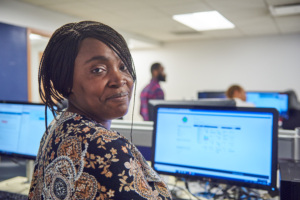
People of Color in Tech: Empowering Diversity
In the ever-changing world of technology, there’s a growing awareness of the importance of diversity, equity, inclusion, and belonging (DEIB) in driving innovation and progress. However, challenges still persist for people of color trying to enter the tech industry. From underrepresentation, barriers to entry, and biases in the workplace, the journey for people of color in tech can be challenging.
However, amidst these challenges, there are opportunities for positive change and growth. This article takes a closer look at the issue, examining the current state of diversity in the tech industry and shining a light on the pivotal role played by organizations like Per Scholas in supporting aspiring technologists.
 Per Scholas is committed to creating a more diverse and inclusive tech workforce by creating opportunities and connections for women and people of color, groups greatly underrepresented in IT employment today. We envision a tech workforce as diverse as the customers it serves and, in order to achieve this, it is important to understand and break down the barriers that deter diverse individuals from entering the tech industry.
Per Scholas is committed to creating a more diverse and inclusive tech workforce by creating opportunities and connections for women and people of color, groups greatly underrepresented in IT employment today. We envision a tech workforce as diverse as the customers it serves and, in order to achieve this, it is important to understand and break down the barriers that deter diverse individuals from entering the tech industry.
Tech Industry at a Glance and Understanding the Current Landscape
Unfortunately, the tech industry faces a significant diversity gap, with statistics showing a notable underrepresentation of people of color within its workforce. Understanding this situation is the first step toward implementing effective solutions.
According to the 2023 Tech Report, approximately 63% of employees in the U.S. technology sector are white, 20% identify as Asian American, 8% as Hispanic or Latino, 7% as Black, and less than 1% as Native Hawaiian, Pacific Islander or Native American.
While there has been a recent emphasis on promoting DEIB within workplaces, especially in the historically white, male-dominated tech field, there’s still much work to be done in order to reduce discrimination, bolster opportunity, and promote DEIB within the workplace.
The reasons behind these disparities are complex and interconnected, rooted in historical and systemic inequalities resulting from discriminatory policies. These inequalities negatively affect people of color in the United States and can limit opportunities for those in communities of color.
Unequal Access to Resources
In the U.S., not everyone has the same opportunities to learn. Persistent systemic inequalities mean that communities of color are more likely to experience poverty, impacting their access to essential resources, including quality education.
Limited educational opportunities, outdated school resources, and understaffed schools hinder the development of necessary skills and knowledge, particularly in STEM fields. Despite incredible potential and talent in communities of color, unequal access to resources and educational opportunities makes it more challenging for people of color to break into certain fields, especially in STEM.
Wage Gap
Despite improvements in education levels among Black Americans in recent decades, a racial wage gap still exists across various industries within the U.S. Studies reveal that employees of color can earn up to 30% less than their white counterparts for the same roles, regardless of performance, education, age, skill level, and gender.
This wage gap is more pronounced in certain industries, including the tech sector, where white employees, on average, earn 6.95% more than Black employees for the same jobs. This difference in pay can be daunting, frustrating, and prohibitive for those looking to break into the tech field.
U.S. Digital Divide
Another factor that influences the tech industry’s diversity gap is the U.S.’s digital divide. The digital divide refers to the unequal access to digital technology, including the internet, that exists in this country.
According to a report by the Pew Research Center, around 1 in 10 Americans (30% of the population) report experiencing problems connecting to or accessing the internet at their homes at least some of the time, while 9% report experiencing this lack of access frequently or all the time.
Due to a number of systemic factors, minority communities, especially in lower-income areas, are more likely than white communities to lack access to high-speed internet and modern computing devices. Statistics from this report show that, while 80% of White adults have access to home broadband, this is true for only 71% of Black adults and 65% of Hispanic adults.
This lack of access limits the ability of people in affected communities to gain digital skills and participate in online learning, certifications, and tech-related activities – all of which are important to launching careers in tech.
Workplace Culture
While increasing opportunities for people of color in the tech industry is crucial, there must be an equal focus on creating an inclusive culture within tech workplaces where employees feel both valued and empowered. Despite recent national attention on DEIB in the workplace, the tech industry still has progress to make in terms of inclusivity.
A 2022 Dice report found that 24% of tech professionals report experiencing direct racial discrimination in the workplace within the last year, and 53% of Black tech professionals say they think racial inequality occurs either very frequently or frequently – higher than the percent reported in any other group.
Some tech companies also lack inclusive policies and practices, making it difficult for employees from diverse backgrounds to succeed. Discrimination and bias in the hiring process can also lead to underrepresentation of minorities in tech companies. Thus, inclusive policies, such as diverse hiring panels and unbiased performance evaluations, are essential for creating a more inclusive workplace.
Lack of Mentors and Role Models
Finally, the perception of the tech industry as predominantly white and male, although based in fact, creates a self-perpetuating cycle. People of color may feel discouraged from pursuing tech careers because of the existing lack of representation.
The lack of diversity means that minority technologists have far fewer mentors and role models from similar racial backgrounds. Without guidance and inspiration, people may struggle to envision themselves succeeding in the tech industry.
Addressing the lack of diversity in the U.S. tech industry requires a comprehensive approach. Critical steps include promoting equal access to education, bridging the digital divide, implementing inclusive hiring practices, and cultivating supportive work environments.
Challenging societal stereotypes and biases is essential for breaking down barriers, enabling talented technologists from all backgrounds to enter and thrive in the tech field.
Per Scholas’ Commitment to Diversity
Per Scholas is determined to make the tech world more accessible for everyone, especially those facing challenges and barriers to entry. We picture a tech workforce that reflects the diversity of the people it serves. Recognizing that diverse talent is everywhere but opportunity is not, we believe a successful workforce begins with fair access to education. That’s why we offer top-notch, accessible, and cost-free tech education to those typically underrepresented in the tech industry.
accessible for everyone, especially those facing challenges and barriers to entry. We picture a tech workforce that reflects the diversity of the people it serves. Recognizing that diverse talent is everywhere but opportunity is not, we believe a successful workforce begins with fair access to education. That’s why we offer top-notch, accessible, and cost-free tech education to those typically underrepresented in the tech industry.
Since 2016, Per Scholas’ Diverse by Design initiative has been partnering with employers to have practical conversations about DEIB in tech. Starting as a discussion series, Per Scholas Diverse by Design aims to serve as a space for tech leaders and workforce developers to share best practices and ideas for attracting, retaining, and developing skilled professionals from diverse communities. Events under this initiative bring together hundreds of participants across the country, guided by a National Advisory Board with members from various tech-related organizations.
 Through focused discussions and advice from DEIB experts, Per Scholas Diverse by Design helps C-suite leaders make valuable and socially impactful business decisions. The initiative also offers organizations tailored training tracks and talent sourcing solutions, allowing them to meet their own talent demands while simultaneously transforming the diversity landscape within their company.
Through focused discussions and advice from DEIB experts, Per Scholas Diverse by Design helps C-suite leaders make valuable and socially impactful business decisions. The initiative also offers organizations tailored training tracks and talent sourcing solutions, allowing them to meet their own talent demands while simultaneously transforming the diversity landscape within their company.
At Per Scholas, we are proud that 85% of our learners identify as people of color. Our specialized courses, like the Per Scholas Columbus Tech Women of Color (TWOC) Tech Fundamentals course, aim to boost diversity in tech. Open to women of color, this course was designed with the goal of understanding how to overcome the barriers women and people of color face when entering the tech industry, and to help unlock the potential of female and POC learners.
Last year, Per Scholas partnered with executive advancement company Guerrero Media to create The Code Breakers: Women in Tech campaign. Each week, this campaign highlights exemplary women who have built successful careers working in tech, breaking down barriers and inspiring other minority technologists to pursue paths in tech. Per Scholas also works closely with local workforce development programs, such as Goodwill and Year Up, to recruit talented, diverse individuals, and launch them on paths to success in the tech industry.
advancement company Guerrero Media to create The Code Breakers: Women in Tech campaign. Each week, this campaign highlights exemplary women who have built successful careers working in tech, breaking down barriers and inspiring other minority technologists to pursue paths in tech. Per Scholas also works closely with local workforce development programs, such as Goodwill and Year Up, to recruit talented, diverse individuals, and launch them on paths to success in the tech industry.
Success Stories: People of Color Thriving in Tech with Per Scholas
As mentioned above, a crucial step in bringing more diversity to the tech field, beyond simply preparing learners with the skills to launch their careers, is showing people from various minority-in-tech backgrounds that success is possible for them in the tech field. In a 2021 study, the Pew Research Center found that over half of Hispanic Americans they surveyed felt that young Hispanic people would be a lot more likely to pursue a STEM degree if they saw examples of high achievers in the field who were Hispanic.
Carla Davis, a Black woman and recent graduate of Per  Scholas’ AWS re/Start course, shared her thoughts on being a woman of color in the field – the smallest minority represented in tech. “I saw that a lot of minorities are not in tech and we didn’t have the guidance or the mentoring, so we kind of opt-out and don’t think of it as a field that we’re used to seeing,” Carla reflected. “Hopefully, I can be some kind of example for others, but it was extremely difficult to get my foot in the door. The instructors and courses at Per Scholas showed me that if I worked hard, it is possible to get the certifications and get the jobs…Even if you don’t have the same starting place, you can learn it.”
Scholas’ AWS re/Start course, shared her thoughts on being a woman of color in the field – the smallest minority represented in tech. “I saw that a lot of minorities are not in tech and we didn’t have the guidance or the mentoring, so we kind of opt-out and don’t think of it as a field that we’re used to seeing,” Carla reflected. “Hopefully, I can be some kind of example for others, but it was extremely difficult to get my foot in the door. The instructors and courses at Per Scholas showed me that if I worked hard, it is possible to get the certifications and get the jobs…Even if you don’t have the same starting place, you can learn it.”
Joseph Diaz, a Black and Hispanic graduate of Per Scholas New York’s Network Support course who now works as a Team Lead in Quality Assurance and DevOps at Barclays, had never reflected much on his race before starting his career in tech. After growing up in a highly diverse Bronx neighborhood, he was surprised to find himself as one of the only Hispanic technologists in a number of the tech industry roles he took on. “[At my job], it’s kind of interesting to be the only Diaz on the mailing roster,” Joseph said. “I don’t see a lot of similar last names or people who I think are Hispanic around me. But I feel like if I give that meaning to my name, imagine what other people could do for themselves. Other people in my neighborhood who are of Black or Hispanic origins ask about my career; it kind of gives them a direction. [They say] ‘hey, I want to do that too because you’re doing it.’ It pushes that boundary.”
career in tech. After growing up in a highly diverse Bronx neighborhood, he was surprised to find himself as one of the only Hispanic technologists in a number of the tech industry roles he took on. “[At my job], it’s kind of interesting to be the only Diaz on the mailing roster,” Joseph said. “I don’t see a lot of similar last names or people who I think are Hispanic around me. But I feel like if I give that meaning to my name, imagine what other people could do for themselves. Other people in my neighborhood who are of Black or Hispanic origins ask about my career; it kind of gives them a direction. [They say] ‘hey, I want to do that too because you’re doing it.’ It pushes that boundary.”
Taking the Leap with Per Scholas: Steps to Empower People of Color in Tech
Per Scholas is committed to creating a tech workforce as diverse as the communities it serves. We acknowledge that there’s still much work to be done in order to reduce discrimination, boost opportunities, and promote DEIB in the tech industry.
The promotion of DEIB in the tech workplace begins with opportunity and intentionality. By understanding the barriers that keep people of color from entering the tech field, we can begin to break them down.
While the IT field still has a long way to go to become totally  diverse and inclusive, Per Scholas is dedicated to driving this change. We aim to transform the technology landscape by opening pathways of opportunity for diverse talent and helping other organizations do the same.
diverse and inclusive, Per Scholas is dedicated to driving this change. We aim to transform the technology landscape by opening pathways of opportunity for diverse talent and helping other organizations do the same.
Empowerment starts with education and opportunity. Together, we can build a future where everyone, regardless of their background, can thrive in the world of technology.
Apply now to Per Scholas and be a part of the change.
Sign up for our Monthly Impact Report
More News

Donate Now
Your support makes a powerful difference in our ability to build a technology talent training solution that creates greater access and equity.

